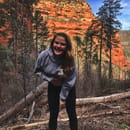For Rose Purtell, a UA junior who studies nutritional science has always wanted to be a healthcare professional. Her mother has told her she used to play “hospital instead of house.” Purtell gave advice to women considering a career in healthcare and their loved ones. She says women should operate independently at some point in their careers to earn credibility. “Open your own practice. The role of taking care of the family is usually set on the female partner in a heterosexual relationship. Gender roles need to be shared between man and woman,” Purtell said.
Purtell credits her childhood pediatrician for comforting her and her three siblings. The positive experiences Purtell had in her childhood pediatrician’s office inspired her to peruse a career in healthcare. She encourages other women to pursue medical careers as she is. “Woman are fulfilling their role in healthcare. Women are the more nurturing half of our species. That correlates to better bedside manner and better overall care,” Purtell said She is working to become a registered dietician before entering medical school. As of now, Purtell wants to become an orthopedic surgeon. However, she notes that could change once she is able to experience all the medical disciplines during the residency portion of her doctoral education. Purtell feels nutritional science is an appropriate vehicle for her to get into medical school and to succeed as a doctor. She says medical school programs do not cover nutrition as thoroughly as they could. “Eating is something that everyone does. When you do not take that into consideration when you are treating a patient you are overlooking a big factor that can influence their overall well-being,” Purtell said. Purtell hopes for Doctors Without Borders after graduating medical school. She says she can be more effective by avoiding the American healthcare system. Purtell is the treasurer of the Women In Medicine and Science (WIMS) club. She says that WIMS research suggests that women often get paid lower salaries and, women are less likely to receive favorable reviews from their superiors. Brenda Ho is a UA senior who studies physiology. She is the president of WIMS. Ho began volunteering in an urgent care clinic when she was 15 years’ old.
She became interested in science in grade six. Ho knew she wanted to become a healthcare professional during her freshman year of high school. She recalled a moment in the lab that engineered her desire to become a pathologist. “I was making copies when the pathologist saw a live bacterium in a culture. She told me to look into the microscope. I thought it was the coolest thing,” Ho said. Ho wishes doctors would listen to their patients more. As a pathologist, she says she will pay attention to detail in order to expedite the diagnosis process. Ho added that she has a lot of support in her journey to become a pathologist. However, she recalled a moment where one of her colleagues was honest with her about what being a pathologist is like. “I talked to a pathologist. She said if she could go back and do it again she would not have become a doctor because of how healthcare has changed. It has become more about business than medicine,” Ho said.


